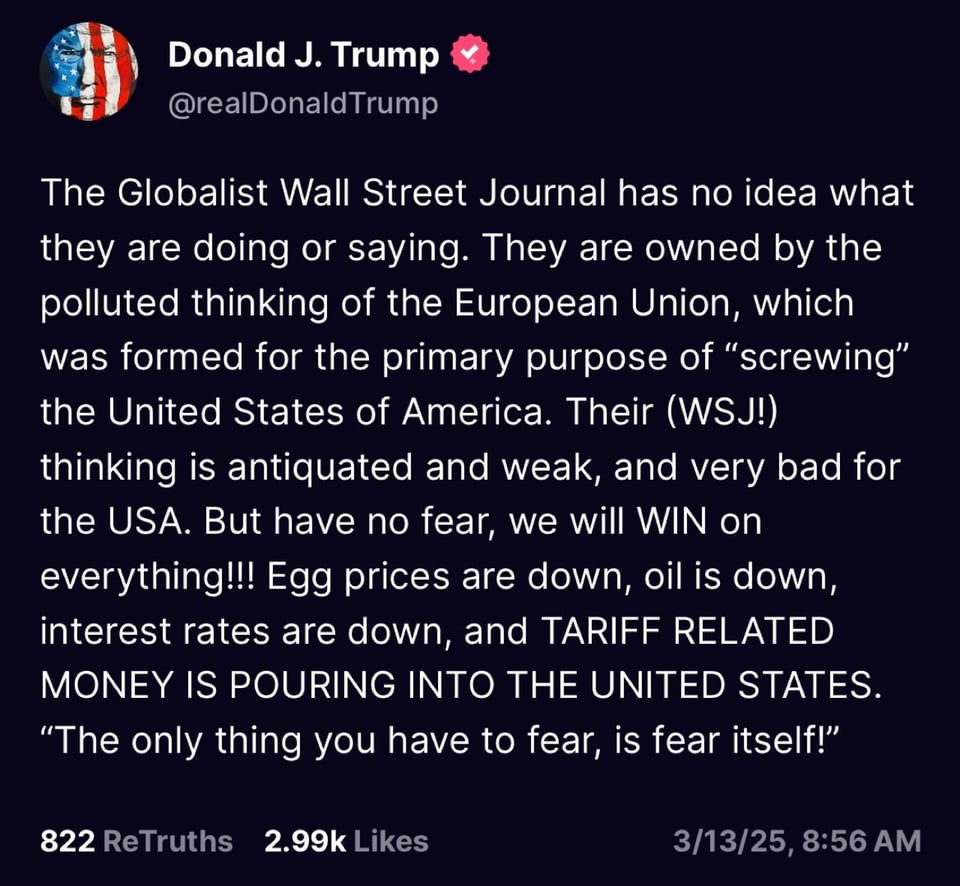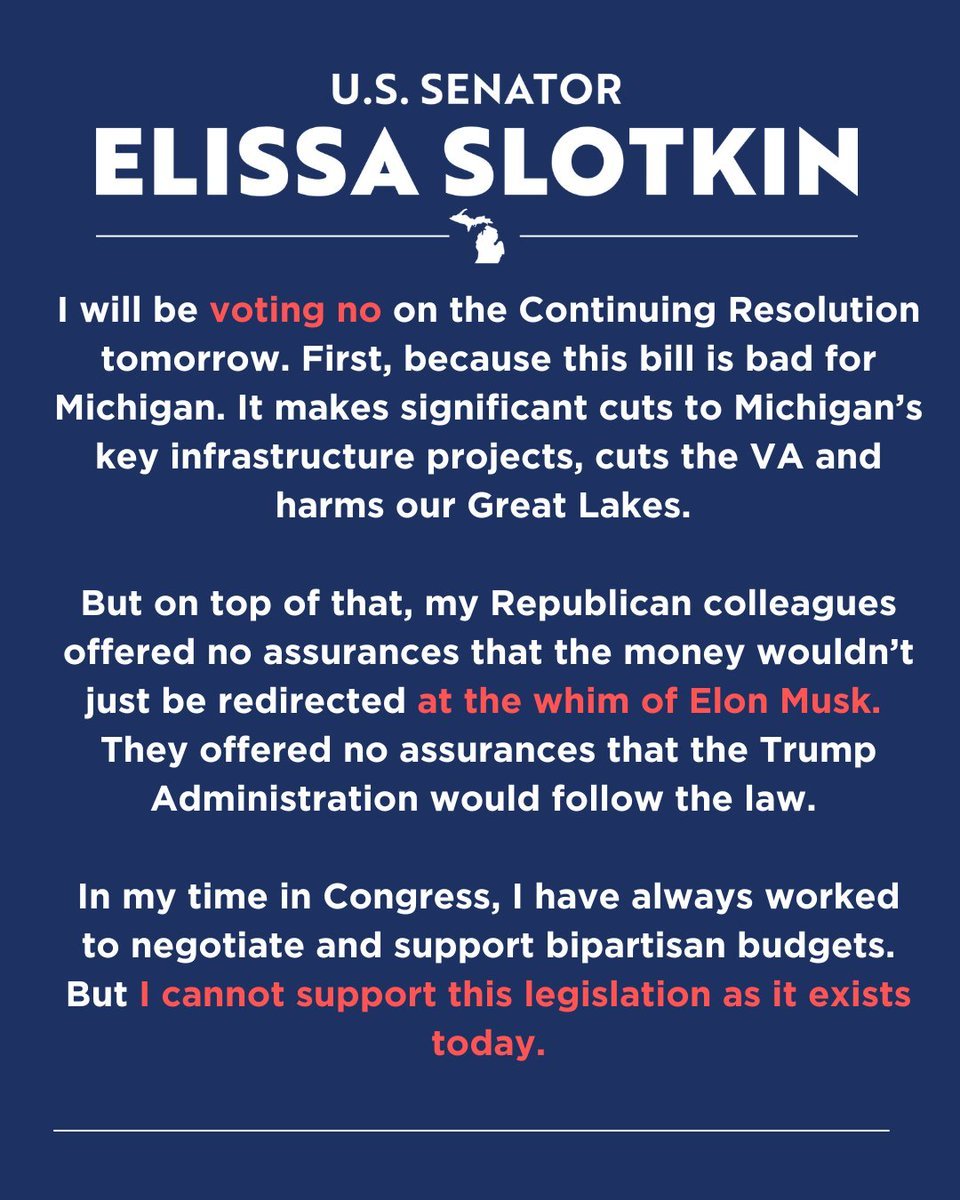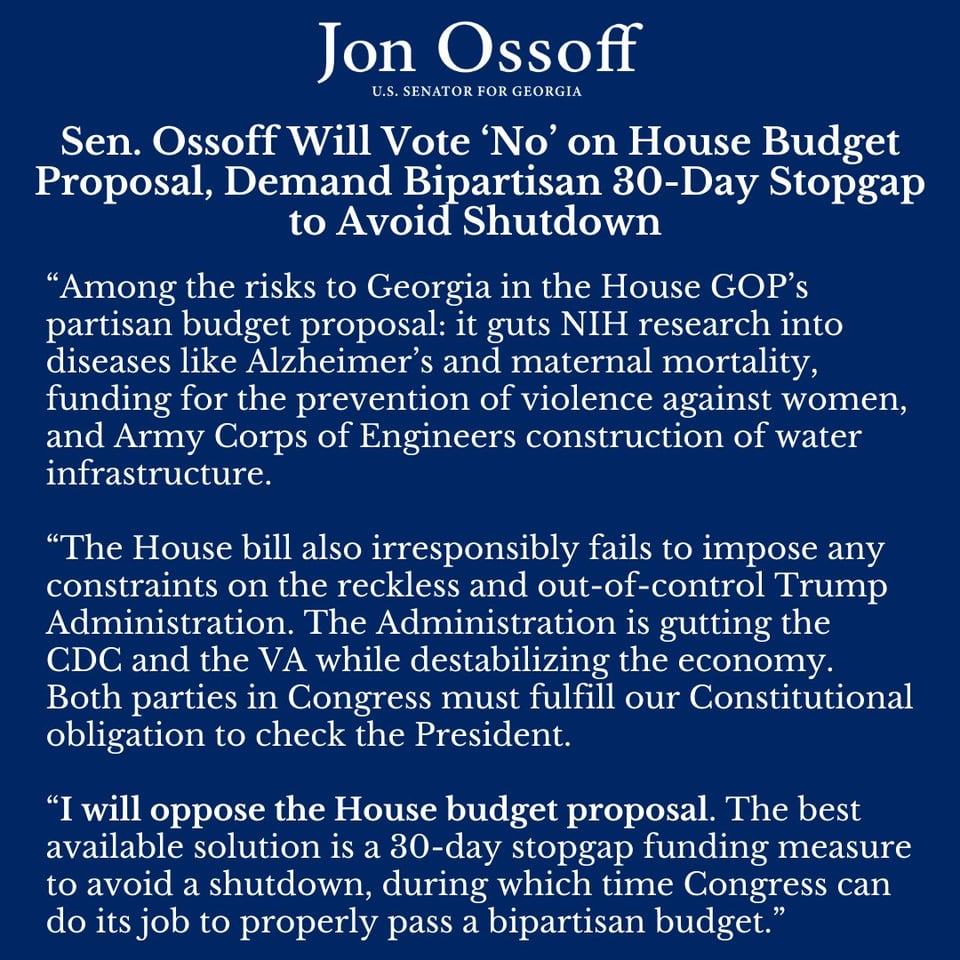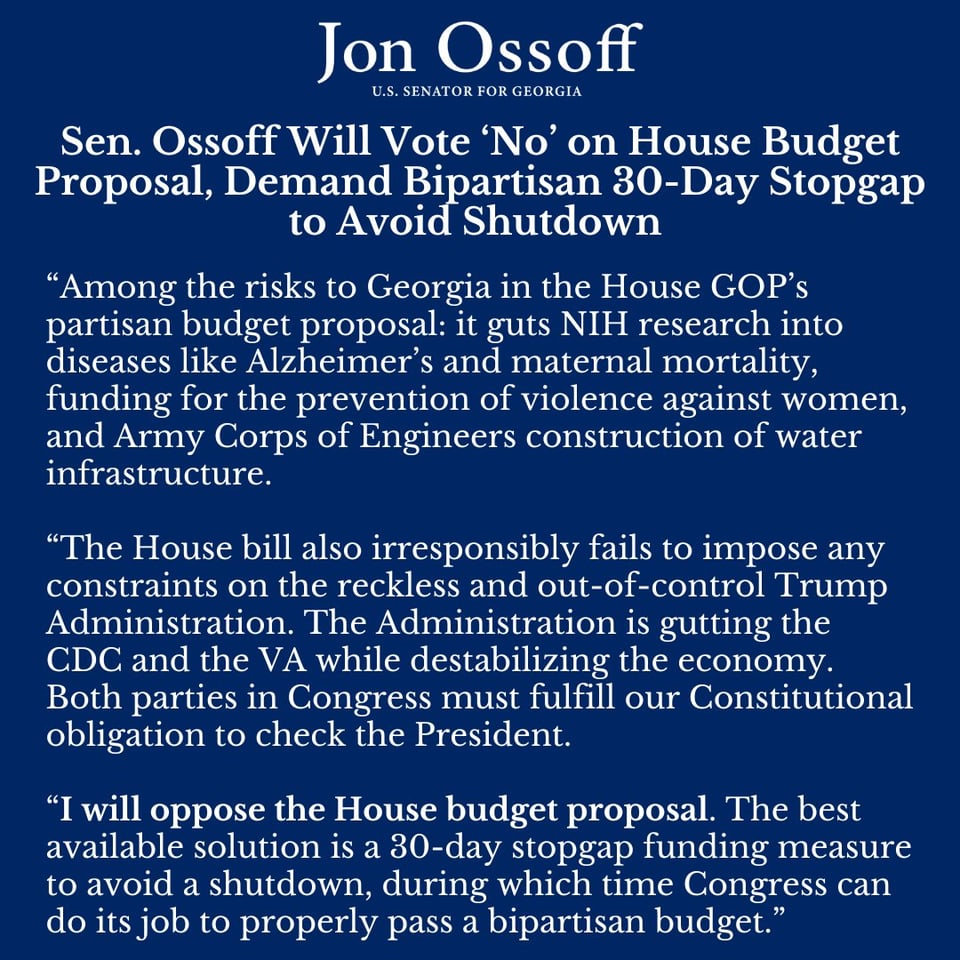Friday, March 14, 2025. Annette’s Roundup for Democracy.
Believe me please.
Wisconsin’s April 1 race for a Supreme Court Seat is really important.

Wisconsin Supreme Court.
Elon Musk has spent about $2 million on this contest to date. The truncated version of poll presented below 👇suggests that, as we move down to the final stretch, our money might just be more effective. Voters may be more tuned in these last two weeks.
March 5. A month before the election, large percentages of registered voters lack opinions of candidates for Wisconsin Supreme Court, state superintendent of public instruction.
Although both races are nonpartisan, substantial partisan differences exist in views of the candidates, majority of voters aware balance of the state Supreme Court will be affected
Also: Trump’s job performance: 48% approve,
51% disapprove. Wisconsin voters overall are skeptical of tariffs and DOGE. Large partisan divides shape opinion on most policy issues.
MILWAUKEE – A new Marquette Law School Poll survey of Wisconsin finds that large percentages of registered voters remain unfamiliar with the candidates for the Wisconsin Supreme Court and the state superintendent of public instruction less than a month before the April 1 elections.
Among registered voters, 38% don’t offer an opinion on state Supreme Court candidate Brad Schimel, former state Attorney General, saying they haven’t heard enough about him or they don’t know if they have a favorable or unfavorable opinion of him. Considerably more, 58%, say they don’t have an opinion of Schimel’s opponent, Susan Crawford.
In the election for state superintendent of public instruction, 64% lack an opinion of incumbent Jill Underly and 71% haven’t heard enough about her opponent, Brittany Kinser.
This Marquette Law School Poll survey was conducted Feb. 19-26, 2025, interviewing 864 Wisconsin registered voters, with a margin of error of +/-4.6 percentage points. To cover more topics a number of items were asked of a random half-sample of 432 registered voters with a margin of error of +/-6.6 percentage points.
Awareness of the candidates is greater among those who say both that they are certain to vote in the election and that they are very enthusiastic about voting. Table 1 shows the relationship between certainty of voting and enthusiasm for each candidate, as well as the favorable and unfavorable opinions for each. Those very enthusiastic to vote are somewhat more familiar with each candidate than the separately measured group of those who say they are certain to vote. Schimel is the best-known candidate, followed by Crawford, Underly, and Kinser for both those certain to vote and those very enthusiastic. Kinser has the most positive net favorability, followed by Crawford, Underly, and Schimel.
Those most involved in the spring elections are those who say they are both certain to vote and are very enthusiastic. This provides a single measure of involvement in the election. This most-involved group makes up 41% of registered voters. For comparison, in the most recent state Supreme Court election, in 2023, 51% of registered voters actually turned out.
Those most involved with the election are much more likely to have an opinion of the candidates than are those who are less involved. The most involved are also more favorable to each of the four candidates than the less involved. There remain differences across the candidates in the percentages of voters without opinions, even among the most involved. Schimel is the best known, followed by Crawford, Underly, and Kinser. Though Kinser is the least known, she has the highest net favorable rating, followed by Crawford, Underly, and Schimel.
Although these races are officially nonpartisan, opinions of the candidates are nonetheless aligned with partisanship of voters, as shown in Table 3 for Schimel and Table 4 for Crawford. Democrats are a bit more aware of Schimel than are Republicans, with independents least able to rate him. Republicans are strongly favorable to Schimel, with a net favorability of +50, and Democrats strongly unfavorable, at a net favorability of -57. He has a net favorability of -16 among independents.
Crawford is better known to Democrats than to Republicans or, especially, independents, though not as well-known as Schimel in any partisan category. She is strongly favorable among Democrats, a net of +34, and almost equally unfavorable among Republicans with a net of -36, while she is net -11 among independents.
Respondents say they are paying more attention to the state Supreme Court race than to the state school superintendent race. For the court, 39% say they have heard or read a lot about that race, while 18% say the same about the superintendent race.
Just over half of registered voters, 51%, say they have a clear idea of what Schimel stands for, while 41% say they are clear about what Crawford stands for. For Schimel, 14% say they are not clear where he stands, while 35% say they haven’t heard enough or don’t know. In Crawford’s case, 17% say they are not clear what she stands for and 42% say they haven’t heard enough or don’t know.
Trump approval and national issues
After six weeks in office for Donald Trump, 48% of those polled in Wisconsin approve of the job Trump is doing as president and 51% disapprove. Opinion is sharply divided, with 38% who strongly approve and 45% who strongly disapprove. Only 10% somewhat approve and 6% somewhat disapprove.
The partisan gap in approval of Trump is particularly large, with 92% approval among Republicans and 97% disapproval among Democrats. In March 2017, at the beginning of Trump’s first term, 77% of Republicans approved and 81% of Democrats disapproved. In the current poll, independents are more disapproving, 60%, than approving, 39%. In 2017, by contrast, independents were more approving, 42%, than disapproving, 32%.
Court-related issues
While many respondents are unfamiliar with the Wisconsin Supreme Court candidates, a large percentage, 83%, say the election can tip the balance on the Court, while 15% say the election will not affect the balance and 2% say they don’t know. Republicans and Democrats are about equally likely to see the balance of the court as up for grabs, with 81% of Republicans and 87% of Democrats saying so. Among independents, 75% say the balance can change as the result of the election.
Among registered voters, 57% say the outcome of the state Supreme Court election is very important to them, while 35% say it is somewhat important. Only 7% say it is not too important and less than 1% say it is not at all important. Those who say the election is less than very important are much less involved in the election than those who say it is very important.
By a 90% to 10% margin, respondents overwhelmingly support electing judges rather than appointing them. There are modest partisan differences, with 85% of Republicans, 91% of independents, and 95% of Democrats favoring judicial elections.
Voters also favor candidates for the state Supreme Court talking about issues in the campaign, with 79% saying this, while 21% say candidates should avoid talking about issues in order to not be seen as prejudging potential cases. Majorities of each partisan group favor discussion of issues, but Republicans are slightly less supportive of discussing issues. Specifically, 79% of Republicans favor candidates discussing issues, compared to 84% of Democrats, and 63% of independents.
While voters align their views of the candidates with their partisan preferences, they are less positive about parties providing large financial donations to the candidates. Just 38% say party contributions give voters a better idea of what the candidates stand for, while 61% say party contributions reduce the independence of judges from politics. On this question, Republicans are more positive about party contributions, with 42% saying these contributions clarify positions, while 28% of Democrats and 52% of independents say that.
One topic likely to reach the Court in the future is the constitutionality of elements of Act 10, the 2011 law substantially limiting public sector unions in Wisconsin, which was recently struck down by a district court. Overall, Act 10 is supported by 42%, while 54% say the law should be struck down as unconstitutional and 4% say they don’t know. There are substantial partisan divisions over Act 10, with 62% of Republicans favoring the law, while 51% of independents and 76% of Democrats want it struck down. In the October 2018 Marquette Law School Poll, respondents were asked if they preferred to keep Act 10 as it is or to return to collective bargaining as it was before Act 10. Keeping Act 10 was favored by 43%, while returning collective bargaining was favored by 42%.
A substantial majority of the public (64%) favor legal abortions in all or most cases, with 36% who say it should be illegal in all or most cases. Opinion on abortion has remained stable since August 2022, following the U.S. Supreme Court decision overturning Roe .v. Wade. (Marquette University Law School Poll)

You can make a difference in this race which is shaping up to be a bellwether of pubic approval of Trump and Musk. It will also determine the political outcomes on women’s rights, abortion, voters’s rights and gerrymandering for Wisconsin voters for the next few years.
Now is the time for you to act.
I urge you to support Judge Susan Crawford here and now!
When will sanity start to prevail about Trump’s deadly economic policies?
As Markets Whipsaw, Conservative Media Shrugs
Many conservative websites have either ignored the recent stock declines or framed them in a positive way.
Nervous investors seeking news about the plunging markets on Monday afternoon would have been out of luck if they turned to the websites of The New York Post, The Daily Caller, One America News or The Blaze. Not one of those right-leaning outlets featured articles about the sell-off as the closing bell rang, cementing Wall Street’s steepest decline of the year.
And Fox Business Network, which pledges to “deliver content focused on investing, optimism and the American dream,” placed coverage of the drop on its site below a story about temporary outages on Elon Musk’s social media site, X.
As President Trump’s unpredictable and halting tariff policies rattled investors this week, many of his most loyal supporters in the media and on Capitol Hill chose to barely mention the news — or to frame it as a potentially good thing.
“Profits are still rising. It’s very hard for me to see a recession,” said Larry Kudlow, the Fox Business host and former Trump adviser, who filmed his show in the Indian Treaty Room of the Old Executive Office Building, across the street from the White House, on Monday afternoon. “I’d kind of suggest people keep their powder dry and pay attention to a well-thought-out economic plan that will indeed make America great again.”
During Mr. Trump’s first term, he regularly pointed to the stock market as a kind of scoreboard for his policies. But in recent weeks he has often refused to dispel worries of a slowdown or recession, telling the Fox Business host Maria Bartiromo on Sunday, “I hate to predict things like that,” and calling this moment “a period of transition.” He added that the United States should look to China’s long-term-planning approach to economics, rather than the quarterly-results focus of Wall Street. “You can’t really watch the stock market,” he said.
That new position was quickly echoed by some online influencers.
Jack Posobiec, who recently traveled with Defense Secretary Pete Hegseth to Europe, dismissed the fears, encouraging people to “pump the brakes” on their financial jitters in a podcast appearance on Tuesday. Chaya Raichik, a right-wing activist known for her Libs of TikTok account, posted on Tuesday that Mr. Trump’s economic positions were “exactly what I voted for.” (She didn’t mention the declining stock market.)
Lawmakers joined in, too. Senator Tommy Tuberville, Republican of Alabama, claimed the retrenchment was overdue.
“We were probably overbloated with the stock market,” he told Mr. Kudlow of Fox Business soon after Monday’s market close. “I don’t think President Trump needs to be concerned about it.”
That remark was in sharp contrast to Mr. Tuberville’s past feelings about financial gyrations. Last August, when stocks suffered a similar one-day decline, he took to X to decry President Joseph R. Biden Jr. and Vice President Kamala Harris’s handling of the economy. “We need steady leadership,” Mr. Tuberville said at the time.
Some conservative outlets expressed concern about the market shock, with the Fox News host John Roberts, for example, noting on Tuesday that “the Dow is 1,500 points below where it was when Trump took office.”
“That’s not a good look,” he added.
But the right’s overall unperturbed response to the stock market illustrates how fully many have absorbed the party line when it comes to the administration’s agenda, even if it hurts their own pocketbooks. And those who did seem to notice the declines have been bending over backward to place blame elsewhere.
“This is happening because we have a president with the balls to undo a globalist economic agenda that’s decimated American wages and quality of life,” Rob Schmitt, a host on Newsmax, said on X. “This is the pain that comes from real change.”
The Fox News host Will Cain likened the country to a person addicted to heroin who was trying to quit.
“Our economy has been addicted to government spending,” Mr. Cain said during his afternoon show on Monday. “The withdrawal of that government spending can send the patient, our economy, into a health crisis. But, ultimately, it has to withdraw to once again get healthy.”
Others rose in support of Tesla, Mr. Musk’s electric car company, which has lost just shy of half its value, or more than $750 billion, in total market capitalization since mid-December, including a 15 percent drop on Monday alone.
“His company and his products are under constant attack, all because he is daring to expose waste, fraud and abuse, and auditing the federal government,” the Fox News host Sean Hannity said on Monday. He made no mention of prolonged sales declines for Tesla in Europe, Australia and California, but pledged to buy a souped-up Model S sedan as a “gesture on my part.”
On Tuesday, Mr. Trump followed his lead, committing to buy a Tesla “as a show of confidence and support for Elon Musk, a truly great American.” He later held a news conference with Mr. Musk outside the White House featuring a row of Tesla vehicles, and selected a red Model S for himself. “When somebody is a great patriot, they shouldn’t be hurt,” he said.
Not everyone on the political right seemed quite so blasé about the market’s downturn.
Stephen Moore, an economic adviser to Mr. Trump during his first administration, called the tariffs “misguided” over the weekend, adding that “the economy looks like it might be headed to a recession.”
Senator Rand Paul, the Kentucky Republican, cautioned the public not to bury its head in the sand. “The market indexes are a distillation of sentiment,” he said. “When the markets tumble like this in response to tariffs, it pays to listen.”
But that pushback was largely drowned out by those eager to downplay the news.
“If you read the morning headlines, you’d think the economy — shoot, the whole nation — was going to hell in a handbasket,” Dagen McDowell, a Fox Business host, said late on Monday. She called talk of a recession “fear mongering.”
Ben Shapiro, a conservative who frequently expounds on economic matters to his 7.23 million subscribers on YouTube, laid out the stakes in purely political terms on Tuesday afternoon. (New York Times)
“If President Trump is blamed for an economic downturn, the effects of that could be disastrous,” he said. “Signals matter an awful lot when it comes to the economy these days.”
But yesterday morning the editor-in-chief of the Wall Street Journal provided a crack in the usually unified right wing dam.
BREAKING: In a shocking twist, the Wall Street Journal Editor in Chief blasted Trump's economic policies on Fox this morning. Trump is already fuming and posting on Truth Social. pic.twitter.com/SVPLEju00B
— Democratic Wins Media (@DemocraticWins) March 13, 2025

Others on the Right seem to be breaking too.
Fox News Suddenly Starts Panicking About Trump’s Economy: “Weakening!” | The New Republic
Yes, they’re still blaming Joe Biden, but the talking heads at Fox are getting awfully nervous that President Trump might be on the verge of sending the economy into a tailspin.
Fox News figures are willing to propagandize on President Trump’s behalf on pretty much every horror that he throws our way. Do Fox personalities back Trump when he sells out our allies in tandem with murderous tyrant Vladimir Putin? Yes, indeed. Do they support Trump when he tries to purge federal workers by the thousands to corruptly replace them with loyalists? Enthusiastically. Do they stick with Trump when he declares himself above the law, explicitly using the language of world-historical dictators to do so? Without reservations.
But it turns out there are limits. One topic Fox personalities are not quite as willing to run interference for Trump on is the economy. And with signs mounting that Trump’s economy is hitting the skids, they are beginning to sound the alarm.
It’s the latest indication that Trump’s political project is suddenly looking quite fragile. And it’s a sign that more dissent is coming.
On Fox News on Friday morning, host Maria Bartiromo practically shouted that “the jobs picture is weakening!” She tried to spin this somewhat positively, insisting investors are rallying because the weakening job market means the Federal Reserve will cut interest rates. But Bartiromo was blunt about the latest jobs report, which she pronounced “weaker than expected.”
That jobs report found that the economy created 151,000 jobs in February, which was slightly under expectations. This left some economists seeing a continued softening in the labor market and some news organizations discerning a “slowdown.”
Beyond this, the overall picture is darkening even more: This jobs report does not fully register the federal job losses unleashed by Elon Musk’s cuts via the so-called Department of Government Efficiency, which are expected to show up any day now. Trump’s tariffs are deeply spooking investors, and his sudden, temporary cancellation of many tariffs intended for Canadian and Mexican exports is only increasing the agitation. As a scalding New York Times assessment of Trump’s economy put it, the “sudden deterioration in the outlook is striking, because it is almost entirely the result of Mr. Trump’s policies.”
Yet what’s also striking is that Fox News figures are willing to go here—sort of, at least.
“I think the boom times are over,” Fox anchor Charles Payne declared Friday, implicitly admitting that the economy under Trump’s predecessor was a lot better. Payne pointed to declines in consumer spending, which he pronounced “scary.”
“We are sliding towards a recession,” Newt Gingrich fretted on Fox News the other day. Gingrich blamed former President Joe Biden for this, naturally, but the admission stands: Trump, you’ll recall, promised that economic nirvana would arrive on day one. Meanwhile, Fox host Larry Kudlow recently suggested that it’s time for Trump to clearly explain to the public how his program will facilitate growth.
Then there’s this striking exchange, flagged by indefatigable independent journalist Aaron Rupar, in which Bartiromo urged Trump to provide certainty about the future of his tariffs, so businesses can plan accordingly. “CEOs want to see predictability,” she said:
Bartiromo was plainly worried that Trump is not getting the message that the tariffs—and his erratic flip-flopping on them—are on the verge of spelling disaster. So she served up an easy opportunity for Trump to project calm. But Trump explicitly declined to take it. Instead of hinting at future certainty, Trump said: “The tariffs could go up as time goes by.”
“That’s not clarity,” a disappointed Bartiromo replied.
A big part of the dynamic here is surely that Fox News is, at its core, allied with the corporate, plutocratic wing of the GOP. Tariffs are such an obvious affront to those interests that Fox figures will struggle to sugarcoat them. This is why you see the Wall Street Journal editorial board brutally attacking the tariffs. And it’s why you see Bartiromo practically pleading with Trump to reassure the plutocrats about them. She’s basically channeling those interests.
Trump’s tariffs, of course, are also taxes on consumers that are likely to harm ordinary Americans across the board. Yet here again, this is something Fox is actually telling its viewers. In a striking segment, Fox recently featured an interview with a car dealer in Pennsylvania who fears Trump’s tariffs will drive up prices. “We’re afraid,” he said. “It’s going to have a gigantic impact on our business.”
Trump’s overall political project is heavily dependent on an enormous network of propagandists and other pliant institutional players to sustain itself. Take Musk’s DOGE: Again and again, DOGE’s revelations of “waste” and “fraud” have themselves proven fraudulent to the point of buffoonery. It requires an immense roar of propaganda from right-wing media and dozens of GOP lawmakers, all declaring falsely that DOGE really is finding all kinds of smoking guns, to keep alive the fiction that it’s producing dramatic results.
This is why Fox turning on Trump’s economy could be so debilitating over time. Perceptions of Trump’s economic prowess are the scaffolding that holds up the rest of the edifice. If the public continues to sour on his economic performance, the deep cuts to government will look less about efficiency and instead appear maliciously, dangerously incompetent. The mass deportations will look less like the protecting of U.S. workers from unskilled foreign labor competition and more like unchecked ethnonationalist cruelty. And Trump’s celebrations of his own impunity won’t come across as the mere rhetorical trash-talking of the strongman who was needed to whip the economy into line. Instead, they’ll sound like what they truly are—the rantings of a genuine wannabe dictator.
It’s no accident that Trump is reining in Musk’s DOGE right at this moment. Trump declared Thursday that cuts will be done with a “scalpel,” not a “hatchet,” and claimed agency heads, not Musk, will have the final say. This isn’t just Trump realizing that decimating government services like Social Security will be unpopular. He also grasps that with economic sentiment turning against him, the idea that Musk is magically removing mere “waste,” liberating the economy to roar forth, becomes a much tougher sell.
The truth is the other way around: The Trump-Musk cuts are already seriously threatening the economy. Miraculously, this is also something Fox is registering: Bartiromo recently suggested on the air that DOGE cuts might “induce a recession.” She, too, managed to blame this on Biden, but the acknowledgment is a significant one. The Trump-Musk agenda has grown so damaging and toxic that this warning must go forth, even if it means admitting to the heresy that cutting government is bad for the economy—and admitting to it right on Fox News. (The New Republic).
Today is the vote on a budget designed by Project 2025.
Democrats prepare to fold on government shutdown
Senate Democrats are prepared to vote Friday to keep the government open, with not much to show for it.
Why it matters: The outcome will spark the fury of many Democrats and the grassroots of the party, who have lobbied this week for the lawmakers to block the short-term funding bill.
But it tracks with Minority Leader Chuck Schumer's (D-N.Y.) longstanding advice that it's bad politics to shut down the government.
Schumer privately told his colleagues Thursday he plans to help break the filibuster on the GOP-led government funding bill, sources told Axios. The New York Times was first to report on his comments.
Zoom in: "While the CR bill is very bad, the potential for a shutdown has consequences for America that are much, much worse," Schumer said Thursday on the Senate floor.
"A shutdown would give Donald Trump the keys to the city, the state and the country," Schumer said.
"The shutdown is not a political game. Shutdown means real pain for American families."
Between the lines: Most of Schumer's colleagues will vote against him. But Senate Democrats only need to provide eight votes to help keep the government open.
Democrats are expected to get amendment votes on the bill, which will give the party members some cover in voting for the package.
The GOP expects the Democratic votes it needs will come from senators up for tough 2026 races as well as those who are retiring, as Axios reported last week. Schumer and Senate GOP leader John Thune (R-S.D.) will need a time agreement to speed up the vote.
The other side: The Senate Democrats' House colleagues aren't buying it.
"Those games won't fool anyone. It won't trick voters, it won't trick House members. People will not forget it," Rep. Alexandria Ocasio-Cortez (D-N.Y.) wrote Thursday on X about a 30-day CR amendment vote.
"Senate Republicans should back down from screwing over their own constituents," said Rep. Greg Casar (D-Texas). "Democrats were elected to fight for working people, not put up a fake fight."
House Democrats were almost unanimous in opposition on Tuesday. Only Rep. Jared Golden (D-Maine) voted for the bill. The bottom line: Schumer ensured he'll be the main Democratic villain of this week's drama. But he'll spare his party the pain of a shutdown and the political consequences no one can predict.(Axios)
One more thing.
The word “fold, “suggesting cowardice and lack of fight in the Axios headline above 👆, may seem right to some but others will think Schumer is doing the right thing.
And there is this too - Schumer has said he is voting yes but not every Democratic Senator is doing that.
Here are some who will vote no.




I will vote NO on the Republican spending bill tomorrow. I want to tell you why. It’s important. pic.twitter.com/Exz74LmqhP
— Chris Murphy 🟧 (@ChrisMurphyCT) March 13, 2025